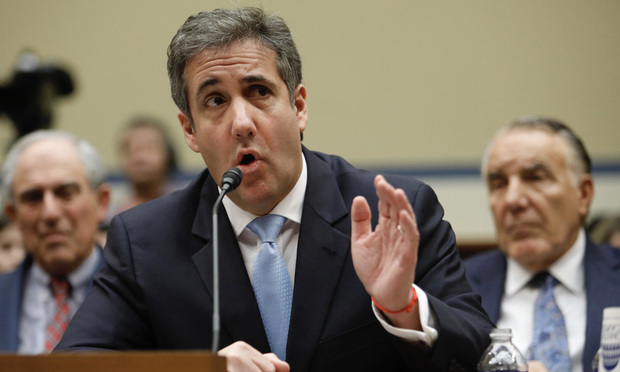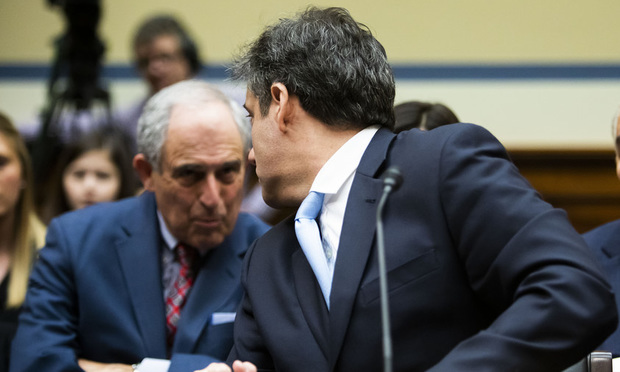Cohen Hearing Spotlights Role as Trump Lawyer, 'Fixer' and Whisperer
Cohen's corporate engagements created controversy for his clients and were cited by critics as examples of shadow lobbying.
February 27, 2019 at 03:30 PM
6 minute read
 Michael Cohen testifies Wednesday at House Oversight. Credit: Diego M. Radzinschi / NLJ
Michael Cohen testifies Wednesday at House Oversight. Credit: Diego M. Radzinschi / NLJ
Michael Cohen testified for hours Wednesday in the U.S. House about his decade-long relationship with Donald Trump, telling lawmakers about his role as a personal lawyer to the New York businessman and how major companies sought his help to decipher the “enigma” of the Republican president and Washington outsider.
Cohen, testifying before the House Oversight Committee, was asked about various contracts he inked with companies that wanted his help in advocating on their behalf in the Trump administration. Prosecutors said Cohen earned more than $4 million from those contracts in the early months of the new administration.
On Wednesday, appearing as a disgraced and newly disbarred former lawyer before the House Oversight and Reform Committee, Cohen detailed how the drugmaker Novartis presented him with a contract proposing that he lobby and provide access to government officials, including Trump. Cohen said he crossed out that portion of the proposed contract, writing that he would not lobby or “do government relations work.”
“A multibillion-dollar conglomerate came to me looking for information, not something that's unusual here in D.C., looking for information, and they believed that I had a value,” Cohen said. “And the value was the insight I was capable of offering them, and they were willing to pay.”
When U.S. Rep. Mark Meadows, R-North Carolina, suggested that he had effectively operated as an unregistered lobbyist, Cohen replied that the final contract spoke for itself.
Cohen's corporate engagements created controversy for his clients and were cited by critics as examples of shadow lobbying. Novartis' former chief executive, Joseph Jimenez, retired in 2017 amid scrutiny of the company's engagement with Cohen. At AT&T, the top in-house lobbyist retired in 2018 after the company's $600,000 in payments to Cohen drew criticism.
AT&T CEO Randall Stephenson last year called Cohen's hiring a “big mistake.” “In this instance, our Washington, D.C., team's vetting process clearly failed, and I take responsibility for that,” Stephenson said last year.
Under questioning Wednesday from Meadows about his $1.2 millions in payments from Novartis, Cohen said he was not hired for access but based on his “knowledge of the enigma Donald Trump.”
Pressed by Meadows about the number of times he consulted, Cohen eventually answered that he spoke with Novartis on six occasions. “Six times? Wow. $200,000 a call,” Meadows said.
Cohen's testimony came a day after he was formally disbarred in New York. Last year, he pleaded guilty to lying to Congress, along with several other federal charges tied to his facilitation of hush-money payments to an adult film actress who alleged a sexual affair with Trump. Cohen is expected to begin serving a three-year prison sentence in May.
“You are a lawyer, right?” asked U.S. Rep. Elijah Cummings, chairman of the House Oversight and Reform Committee.
“As of yesterday, I am no longer a lawyer,” Cohen replied.
A Question of Credibility
From the outset of Wednesday's hearing, Republicans sought to discredit Cohen as a serial liar. U.S. Rep. Jim Jordan, the top Republican on the House Oversight and Reform Committee, traced Cohen's turn against Trump to the fact that he did not receive a White House job.
Cohen said he was “extremely proud” to serve as the president's personal attorney and had, in fact, rebuffed an offer to serve under then-White House Counsel Donald McGahn.
“I did not want to go to the White House. I was offered jobs. I can tell you a story of Mr. Trump reaming out Reince Priebus because I had not taken a job where Mr. Trump wanted me to, which was working with Don McGahn at the White House general counsel's office,” Cohen said.
Cohen admitted lying in the past but insisted his testimony Wednesday was truthful.
 Michael Cohen confers with Lanny Davis on Wednesday at the House Oversight hearing. Credit: Diego M. Radzinschi / NLJ
Michael Cohen confers with Lanny Davis on Wednesday at the House Oversight hearing. Credit: Diego M. Radzinschi / NLJHow Cohen Connected With Lanny Davis
Cohen told lawmakers that his lawyer, Lanny Davis, was representing him pro bono—at least for now. Davis, a former lawyer and aide to President Bill Clinton, has served as chief counsel for Cohen, succeeding Steve Ryan, a McDermott Will & Emery partner. Cohen testified that Ryan referred him to Davis.
Cohen said Davis and Michael Monico, of Chicago's Monico & Spevack, prepared him for Wednesday's congressional hearing. Cohen brought on Monico and Barry Spevack in January in advance of the hearing.
“This is the Michael Cohen hearing presented by Lanny Davis. That's right, Lanny Davis choreographed the whole darn thing. The Clintons' best friend, loyalist, operative. Lanny Davis put this all together,” Jordan said during one exchange.
One Republican appeared puzzled that Davis would represent Cohen without compensation.
“So he's doing all this work for nothing?” U.S. Rep. Jody Hice, R-Georgia, asked.
“Yes sir, and I hope so,” Cohen responded.
“I kind of doubt it,” Hice said.
Under questioning from Jordan later in the hearing, Cohen said he expects to pay Davis once he starts to earn a living again.
“He's going to wait three years? Wow,” Jordan said. He added: “That's a first. I've never known a lawyer to wait three years to get paid.”
Cohen replied: “I guess he thinks it's important.”
Read more:
Michael Cohen, Man of Many Regrets, Testifies With Little More to Lose
Cohen Announces New Counsel Ahead of Expected Congressional Testimony
This content has been archived. It is available through our partners, LexisNexis® and Bloomberg Law.
To view this content, please continue to their sites.
Not a Lexis Subscriber?
Subscribe Now
Not a Bloomberg Law Subscriber?
Subscribe Now
NOT FOR REPRINT
© 2025 ALM Global, LLC, All Rights Reserved. Request academic re-use from www.copyright.com. All other uses, submit a request to [email protected]. For more information visit Asset & Logo Licensing.
You Might Like
View All
Ozempic Defendants Seek to Shave 'Tacked On' Claims From MDL Complaint
3 minute read
FTC Launches Inquiry of Single-Family Rental Home 'Mega Investors,' Issues PBM Report
5 minute read

'Nuclear Option'?: Eli Lilly Taps Big Law Firms in Federal Drug Pricing Dispute
3 minute readTrending Stories
- 1Public Notices/Calendars
- 2Wednesday Newspaper
- 3Decision of the Day: Qui Tam Relators Do Not Plausibly Claim Firm Avoided Tax Obligations Through Visa Applications, Circuit Finds
- 4Judicial Ethics Opinion 24-116
- 5Big Law Firms Sheppard Mullin, Morgan Lewis and Baker Botts Add Partners in Houston
Who Got The Work
J. Brugh Lower of Gibbons has entered an appearance for industrial equipment supplier Devco Corporation in a pending trademark infringement lawsuit. The suit, accusing the defendant of selling knock-off Graco products, was filed Dec. 18 in New Jersey District Court by Rivkin Radler on behalf of Graco Inc. and Graco Minnesota. The case, assigned to U.S. District Judge Zahid N. Quraishi, is 3:24-cv-11294, Graco Inc. et al v. Devco Corporation.
Who Got The Work
Rebecca Maller-Stein and Kent A. Yalowitz of Arnold & Porter Kaye Scholer have entered their appearances for Hanaco Venture Capital and its executives, Lior Prosor and David Frankel, in a pending securities lawsuit. The action, filed on Dec. 24 in New York Southern District Court by Zell, Aron & Co. on behalf of Goldeneye Advisors, accuses the defendants of negligently and fraudulently managing the plaintiff's $1 million investment. The case, assigned to U.S. District Judge Vernon S. Broderick, is 1:24-cv-09918, Goldeneye Advisors, LLC v. Hanaco Venture Capital, Ltd. et al.
Who Got The Work
Attorneys from A&O Shearman has stepped in as defense counsel for Toronto-Dominion Bank and other defendants in a pending securities class action. The suit, filed Dec. 11 in New York Southern District Court by Bleichmar Fonti & Auld, accuses the defendants of concealing the bank's 'pervasive' deficiencies in regards to its compliance with the Bank Secrecy Act and the quality of its anti-money laundering controls. The case, assigned to U.S. District Judge Arun Subramanian, is 1:24-cv-09445, Gonzalez v. The Toronto-Dominion Bank et al.
Who Got The Work
Crown Castle International, a Pennsylvania company providing shared communications infrastructure, has turned to Luke D. Wolf of Gordon Rees Scully Mansukhani to fend off a pending breach-of-contract lawsuit. The court action, filed Nov. 25 in Michigan Eastern District Court by Hooper Hathaway PC on behalf of The Town Residences LLC, accuses Crown Castle of failing to transfer approximately $30,000 in utility payments from T-Mobile in breach of a roof-top lease and assignment agreement. The case, assigned to U.S. District Judge Susan K. Declercq, is 2:24-cv-13131, The Town Residences LLC v. T-Mobile US, Inc. et al.
Who Got The Work
Wilfred P. Coronato and Daniel M. Schwartz of McCarter & English have stepped in as defense counsel to Electrolux Home Products Inc. in a pending product liability lawsuit. The court action, filed Nov. 26 in New York Eastern District Court by Poulos Lopiccolo PC and Nagel Rice LLP on behalf of David Stern, alleges that the defendant's refrigerators’ drawers and shelving repeatedly break and fall apart within months after purchase. The case, assigned to U.S. District Judge Joan M. Azrack, is 2:24-cv-08204, Stern v. Electrolux Home Products, Inc.
Featured Firms
Law Offices of Gary Martin Hays & Associates, P.C.
(470) 294-1674
Law Offices of Mark E. Salomone
(857) 444-6468
Smith & Hassler
(713) 739-1250








